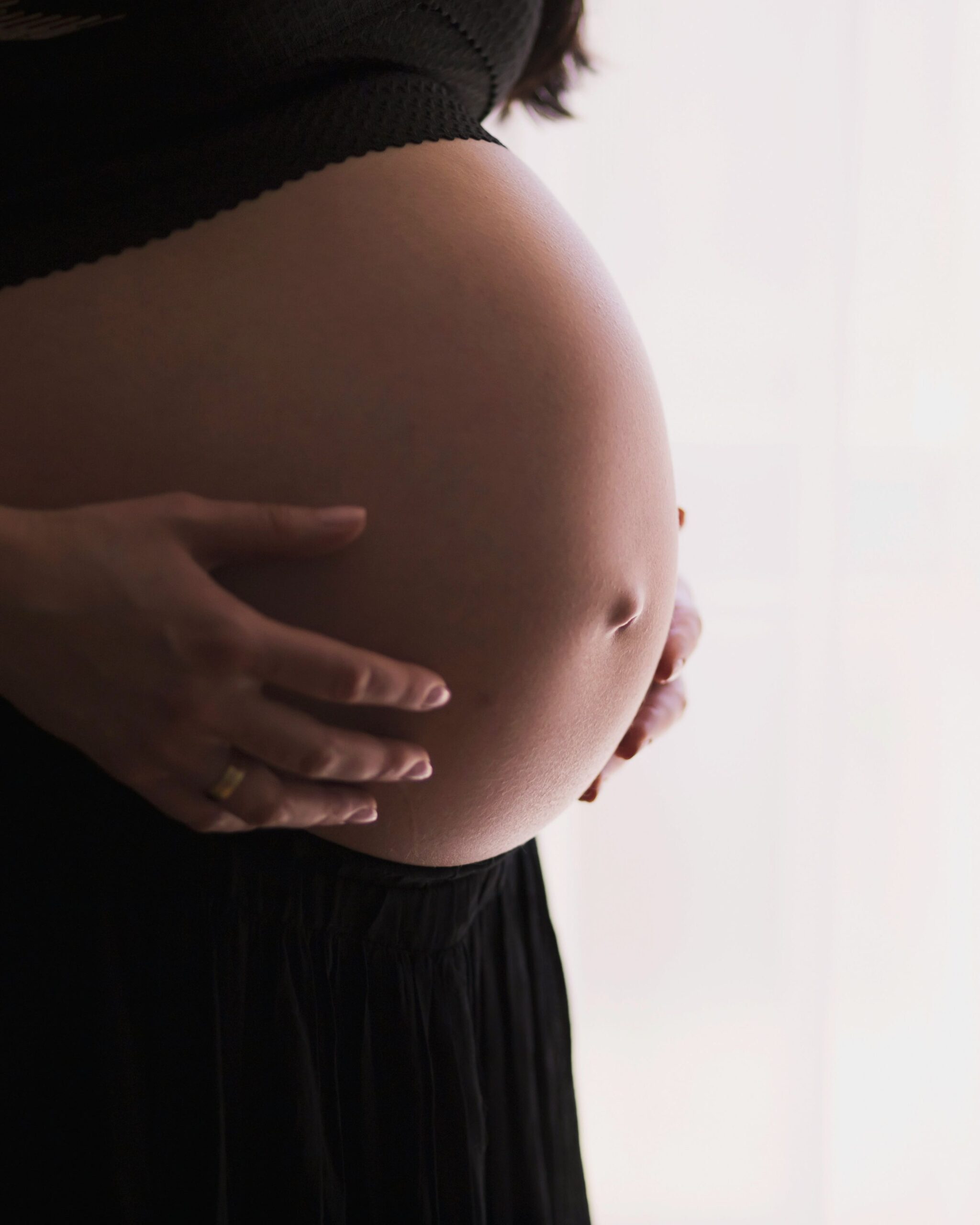This post may contain affiliate links, meaning that if you click and make a purchase, I may earn a commission at no additional cost to you. Read the full disclosure here.
Last Updated: September 19, 2024
Navigating pregnancy and childbirth in France was quite the adventure! Here are some things that surprised me about my pregnancy experience as an American abroad.
✨ Note: This was my first pregnancy, so I can’t make direct firsthand comparisons between France and United States in this domain. However, there were still quite a few things that stood out to me based on my knowledge of the American system and experiences I’ve heard secondhand. I’d love for you to chime in with your relevant experiences in the comment section!

Paid Parental Leave
Coming from the United States, paid time off feels like a luxury to me, although it’s a well-established right in France. Paid leave for both parents is available whether giving birth or adopting a child. In most cases, maternity leave in France is 16 weeks and paternity leave is 28 days.
Even self-employed individuals, like myself, have the right to take paid time off to welcome a new addition to their family.
💶 Note: Paid time off does not necessarily mean receiving a full salary while not working. Generally, the government gives a percentage. Your employer may offer to top it off, but they are not required to do so!
Extensive Prenatal and Postnatal Care
My list of prenatal and postnatal appointments was lengthy. Of course, there were all the appointments you’d expect, such as blood and urine tests, ultrasounds, monthly check-ins, and birthing and parenting classes. Some things that I didn’t expect included a dental exam, monthly toxoplasmosis screening, prenatal and postnatal interviews (with both parents), and postpartum home visits.
Of particular note is the care towards postpartum pelvic health. It is standard practice to be prescribed sessions for perineal reeducation (rééducation du périnée). This pelvic floor therapy essentially consists of Kegel exercises supervised by a midwife or physiotherapist (kinésithérapeute).
A preventative measure, pelvic floor therapy helps prevent and address incontinence, pelvic organ prolapse, and discomfort during intercourse. Many women in France are often additionally prescribed postpartum abdominal reeducation with a physical therapist for similar reasons.
Among moms who joked about it, I had always heard that it was “normal” to pee when you sneeze or cough after having a baby. In my mind, I had imagined that it was something to be expected that you have to live with… maybe it’s not.
Great Healthcare Reimbursements
Obligatory medical exams and consultations, including birthing and parenting classes, are fully covered by the French national health program (l’Assurance Maladie).
All other pregnancy-related expenses, such as lab work and ultrasounds, are covered at 70% through the end of the 5th month. Generally, from the start of the 6th month, all medical expenses (pregnancy-related or not) are fully covered.
It should be noted that coverage is limited to the base rates set forth by l’Assurance Maladie, but it’s relatively easy to find practitioners that adhere to these rates.
Between the state-sponsored health plan and my top-up private insurance (mutuelle), I barely paid for anything pregnancy-related. I was quite surprised to get compression socks under prescription at no cost but was even more shocked that I could rent a hospital-grade breast pump without paying anything out of pocket.
Top-up health insurance is not required in France, and some might consider it an unnecessary expense if they don’t visit the doctor all that often. However, I think it is well worth it for pregnancy, postpartum care, and child-related healthcare. If you need a top-up insurance, I recommend contacting Fab French Insurance. They’ll find you affordable options based on your specific situation.
Low-Cost Hospital Stay
Costs related to childbirth can vary depending on whether you give birth in a public or private maternity hospital. In general, though, the stay will be far cheaper than in any (reputable) Parisian hotel!
➡️ By the way, I’m referring to it as the hospital, but maternity wards in France are typically stand-alone buildings. They are often separate from the main hospital with their own entrance.
To be honest, the only thing I ever saw a price tag on regarding my hospital stay was the cost of a single, private room, billed at 70€ a night. This luxury was not covered by social security at all, but it was fully covered by my mutuelle. Since I gave birth in a public hospital, I’m fairly certain everything else related to my childbirth was completely covered by the national healthcare plan. At any rate, it was all taken care of because I never got any kind of bill!

Our only out-of-pocket expense was Jonathan’s overnight stay in my room. His stay was billed at 34,65€/night for a bed and 2,13€ for each breakfast. He could have additionally received lunches and dinners at cost.
I shudder to think what my final hospital bill would have looked like stateside. Not to mention, the stress of navigating deductibles and in-network and out-of-network costs.
3-5 Day Hospital Stay on Average
In the case of a natural birth (par voie basse) with no complications, the minimum stay is 72 hours (3 days) after giving birth. The minimum stay following a C-section (césarienne) is typically 96 hours (4 days) after delivery. If desired, it’s possible to voluntarily check yourself out ahead of the minimum stay.
The average stay in the maternity ward in France is between 3 and 5 days. Of course, if the baby isn’t gaining weight or other complications arise, it’s not unheard of to be advised to stay longer than the minimum. On the other hand, depending on the current capacity of the maternity ward, you may be encouraged to leave early to free up a bed! Personally, I figured I’d stay as long as they let me!
I find it interesting that they frame is as “minimum” stays here in France. Many of my friends who gave birth in the United States were encouraged to leave within 24-48 hours.
Midwives Rule the Birthing Domain
One of the first things you do upon confirming your pregnancy is decide on a health professional to monitor your pregnancy.
Many women in France choose to be monitored by a midwife. Even those who consult a gynecologist for a more complicated or high-risk pregnancy might periodically turn to a midwife (sage-femme) for advice. They are “wise women” after all.
In the maternity ward, a midwife usually accompanies you throughout the birth and especially during active labor. A gynecologist, an anesthesiologist, a nurse, and others will certainly be on hand and present in the ward to assist as needed. However, it’s more often the midwife calling the shots.
P.S. Midwives in France cover a larger scope of services than what is typical in the United States. It’s very common to see a midwife for routine gynecological care in France.
High Epidural Rates
Like in the U.S., natural birthing positions aren’t particularly promoted or encouraged here. Even in Paris, there is only one really well-known hospital that proposes various tools such as birthing pools, acupuncture, and walking epidurals to manage pain and discomfort during childbirth (Les Bluets).
According to the World Population Review, epidural rates in France are at 80%, compared with 67% in the United States. Both are considered high rates. Many maternity hospitals in France only offer the regular epidural which requires you to remain in bed and give birth in a gynecological position.
I’m not sure what I was expecting, but the high epidural rate did take me by surprise. Although I was by no means forced to have an epidural, it felt like this was the presumed option throughout my care, including during the required meeting with an anesthesiologist.
41-Week Term
France calculates pregnancy as a 41-week term from the date of your last period (date des dernières règles). In some cases, the given due date might simply be nine months from this date. In the United States, the term is counted as 40 weeks.
Babies in France are given a little more time to come out on their own terms, so to speak!
Did any of these things surprise you? Let me know in the comments below!


Great to hear. It’s definitely way better than in the US…
Most of what I listed here is indeed very positive!!
I gave birth 4 times in the US. I thought I wanted to go “natural” until I had been in labor with my first for 47 hours after my water broke. We were in Maine, a more naturally oriented state, and I was not able to get an epidural once I realized how much I needed one. Birth number 2 I was also denied. Birth number 3 I had a delivery nurse who knew how to play the system to ask at the right time before they could say “give it more time” or “its too late”. That was the most lovely birth experience. I was able to focus on the joy of welcoming our third child instead of the pain. Fourth birth I was in labor for14 hours after my water broke. I was not able to convince that hospital to give an epidural either. Maine hospitals really prefer deliveries happen without epidurals.
The longest I was allowed to stay was 2 nights. Some of the deliveries I was released the next day. I think France does it the right way, allowing mothers a little longer to regain their strength. The US system is too driven by insurance companies.
Love all the extra pre and post care that France provides/requires. Viva la France!
Good luck w your new little bebe!
Oh wow! Thanks for sharing your experience, Cathy. (And for your well wishes for our bébé 😊) Totally agree with you that mothers should be allowed to stay a little longer. I feel very grateful to have given birth here in France.
curious if anyone in the healthcare system brought up the Frédérick Leboyer method of birthing?
I just looked it up because I hadn’t heard of that method, so I guess that answers your question. 😅 Just in briefly reading up on the method, the only part that I noticed in my own experience was having immediate skin-to-skin contact, which seems to be highly encouraged here!
I was surprised by your comment “Like in the U.S., natural birthing positions aren’t particularly promoted or encouraged here.” I’m a pregnant American living in the Alps. My gynecologist and 2 midwives have encouraged lots of movement during labor and a variety of natural birthing positions. I will be going to a small, public hospital to give birth and there is a birthing pool. The maternity ward is in the main hospital building and not a separate building. I have been told that an epidural is completely my choice and that it’s possible to have a lower dose, too, so that movement during labor is still possible.
Wow, that sounds great! Thanks for sharing your experience. Wishing you all best as you welcome your little one 😊